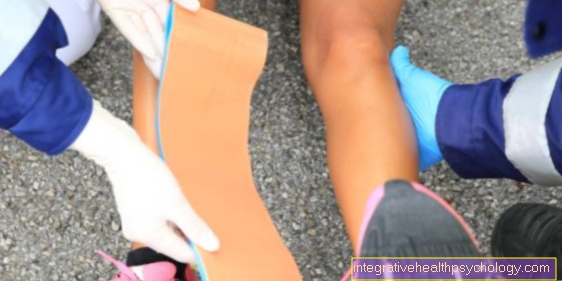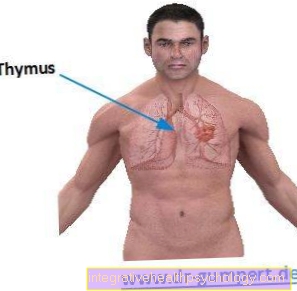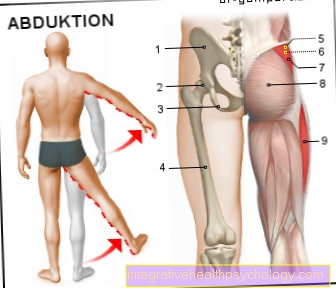Vaccinations for adults
introduction
These days, vaccinations are part of everyday medical practice and have resulted in diseases such as smallpox, poliomyelitis or mumps being only known from stories or books in most of the younger generations in the western world, but rarely occurring.
In general, basic immunization should be completed in childhood.
However, some vaccinations such as tetanus or diphtheria require a booster dose every 10 years.
Other vaccinations, such as the flu vaccination, are only recommended from a certain age and are therefore part of the vaccination schedule for adults.
If no vaccination against meningitis was given in childhood, this can be done in adulthood.

What vaccinations should an adult have?
There are some standard vaccinations in Germany that you should have received as an adult regardless of lifestyle (travel, possibly medical profession, etc.).
These include vaccinations against tetanus, diphtheria, whooping cough, poliomyelitis (after vaccination in childhood usually lifelong immunity; if vaccination is not available in childhood, the poliomyelitis virus is infectious and dangerous for adults too), measles, mumps (if you were born after 1970 ) and rubella.
Read more about this under
- Vaccination against diphtheria
- Vaccination against polio
- Vaccination against whooping cough
- Vaccination against measles
In addition to these vaccinations, there are a number of other vaccines that are only recommended for people at particular risk.
These include cholera, yellow fever, meningococci and Japanese encephalitis, if you come to the relevant infection areas while traveling (more information about which pathogens can be found in which countries can be found on the website of the Foreign Office.
Because the disease is often fatal, people over the age of 60 should be vaccinated against influenza and pneumococci.
People who live in the southern half of Germany or in TBE risk areas should protect themselves against tick-borne early summer meningo-encephalitis (TBE) vaccinate.
Girls from 9 to 12 years of age or adult HPV negative women should also protect themselves against human papillomaviruses (HPV) vaccinated, which can cause cervical cancer.
Read more about this under
- Vaccination against meningitis
- Flu shot
- Vaccination against pneumonia
- Vaccination against cervical cancer
What are the general side effects after vaccination in adults?
Just like all other medicines, vaccinations have in addition to the desired effect, there are also side effects.
The individual vaccination decision should be supported by the Weighing the Risks by the disease happened to those after vaccination. This is also the procedure that the Standing Vaccination Commission (STIKO) uses when choosing its vaccination recommendations.
In terms of the frequency of side effects, a distinction is made between very common (10%), common (1-9%), occasional (0.1-0.9%), rare (0.01-0.09%) and very rare ( less than 0.01%).
There are basically two types of vaccines. The Live vaccines such as. against measles, mumps, rubella or yellow fever, which from modified pathogens arise, solve often severely weakened symptoms the respective disease and also generally lead to a stronger defense reaction of the body.
Of the advantage with live vaccines is that hardly any auxiliary materials must be used, which intensify the vaccination reaction.
Also need live vaccines fewer or no refreshments.
Opposed to this are the Dead vaccines such as. Against rabies, meningococci or poliomyelitis, in which only virus particles are administered.
Dissolve dead vaccines often fewer side effects and a weaker vaccination reaction, however they often have to follow a certain pattern repeated administered and do not guarantee lifelong immunity.
To the so-called from the Paul Ehrlich Institute Vaccination side effects to the usual extent belong Redness, local swelling or Pain in the areathat has been injected into.
These symptoms are common and should usually go away after a few days.
In addition, fever below 39.5 ° C, malaise, nausea and headache can often occur.
Joint problems or seizures are rare, and neuropathies are very rare.
The common symptoms are not to be classified as dangerous and occupy rather the immune defense activated by vaccination.
Read in addition Can you do sports after a vaccination?
How long do the side effects last after vaccination?
How long the side effects of a vaccination last depends on many factors. Among other things, this depends on the vaccine. For example, flu vaccinations have a slightly longer side effect than TBE vaccinations. Furthermore, the duration also depends heavily on the immune system of the vaccinated person. Some side effects also last longer than others. For example, the typical muscle pain after a vaccination lasts longer than a slight fever.
An can say that, depending on the vaccination, the side effects can last anywhere from a few hours to five days. If the side effects have not disappeared after five days, a consultation with a doctor is recommended.
When can I do sports again after a vaccination?
As a rule, there is nothing wrong with light physical exertion after the vaccination, for example going for a walk or light housework and gardening. However, you should wait at least until the next day with strenuous activities, because exercise can intensify temporary vaccine reactions such as redness, swelling and pain.
If in doubt, you should wait until these have disappeared. No vaccination should be given directly before surgery. Depending on the type of vaccine, there should be two weeks between vaccination and surgery
Read more on the topic: Can you do sports after a vaccination?
Pain after vaccination
In the case of vaccinations, especially in the case of dead vaccines, auxiliary substances, so-called adjuvants (lat. adiuvare = help), which are contained in the injected solution and support the effectiveness of the vaccination by stimulating local immune cells.
An example would be aluminum, which is added to inactivated vaccines at a dose of 0.125-0.82 milligrams.
By way of comparison, most untreated foods in Europe contain less than 5 milligrams of aluminum per kilogram of food, according to a statement issued by the European Food Safety Authority in 2008. In non-European products such as fish from Asia or in-European products such as baked goods, various types of tea and vegetables or spices, the aluminum content can be well over 5 milligrams per kilogram of food.
The risk-free intake of aluminum per day, classified by the Food Safety Authority, is around one milligram per kilogram of body weight.
However, these adjuvants often trigger the classic local pain at the injection site or on the injected arm.
This happens through the stimulation of local immune cells such as the Langerhans cells in the skin, which in turn release inflammatory substances, so-called cytokines. These cytokines cause, among other things, an increase in temperature and swelling at the injection site.
The intensity of the side effects is individual and varies from vaccine to vaccine.
For example, the polio vaccine is much better tolerated than the tetanus vaccine.
For most people, the side effects subside after 1-3 days, if there is no improvement after a long time, it is advisable to see your family doctor.
Read more on the topic: Vaccination side effects
Fever after vaccination
Unlike the pain and swelling, post-vaccination fever is caused by the vaccine itself.
This increase in temperature represents a physiological, i.e. natural reaction of the body to the pathogen particles, the so-called antigens (antibody-generating (pathological cell components)).
These antigens have to be taken up by local immune cells, the so-called dendritic cells, and presented to the locally resident lymphocytes after they have migrated to the lymph nodes.
After the so-called antigen presentation, activated B-lymphocytes develop into B-memory cells. These memory cells can produce specific antibodies directed against the vaccinated antigen as soon as the body comes into contact with the pathogen.
This ensures immunity.
In order to make it easier for the dendritic cells to migrate into the lymph nodes, inflammatory factors are formed that can increase the body's core temperature.
If the fever has not gone down after a few days or if temperatures exceed 39 ° C, a doctor should be consulted.
Read more on the topic: Fever in adults after vaccination
List of different vaccinations
Tetanus vaccination
The Tetanus vaccination is done with a Dead vaccineso that the body does not have to produce antibodies itself, but is injected directly with them.
This means that antibodies against the tetanus toxin can be administered during vaccination without major side effects. However, this leads to Degradation of the antibodies after a whileso that a Regular refreshment of the vaccination protection every 10 years necessary is.
tetanus leads to the clinical picture of Tetanus and can be fatal.
The toxin-producing bacteria are in the soil and can get into the wound and the body through minor injuries and contact with soil. For this reason, this vaccination is absolutely necessary and must be renewed regularly.
Diphtheria vaccination
Similar to the tetanus vaccination, the diphtheria vaccine is also a dead vaccine, which means that the body does not have to produce antibodies.
So the diphtheria vaccination is necessary every 10 years.
Diphtheria is a very dangerous disease caused by the Corynebacterium diphtheriae. It is transmitted from person to person by droplet infection and usually affects the throat and pharynx area first. In addition to a sore throat, redness and plaque, the lymph nodes and the entire throat area can swell massively, so that attacks of suffocation can occur.
Other organs such as the kidneys, heart or liver can also be affected. Circulatory failure, heart muscle inflammation and severe kidney damage can occur.
Even if the disease is very rare in Germany, it can be infected at any time through constant travel. Because diphtheria is very difficult to treat, every adult should have a new vaccination every 10 years. The diphtheria vaccination can be given together with the tetanus vaccination as a combination vaccine, so that only one injection is necessary.
Read more about this under Vaccination against diphtheria
Vaccination against viral flu (influenza)
The Virus flu is a worldwide diseasewhich leads to a new wave of flu every autumn.
Since the flu virus changes slightly from year to year due to mutations, the vaccine from the previous year does not protect against illness caused by the current virus!
For this reason, the vaccination is developed and administered again every autumn.
The flu itself is a very severe one transmitted by droplet infection Disease mainly of the upper respiratory tract, with high fever, one poor general condition, to cough, severe pain in the limbs and one massive feeling of illness goes hand in hand.
It cannot be compared to a cold or a flu-like infection. Healthy people with a strong immune system can be severely weakened and ill from the flu for some time, but there are seldom major complications.
Complications are bacterial superinfections, Cardiovascular failure or Inflammation of the heart muscle.
Are particularly at risk elderly and People with risk factorssuch as a chronic disease (e.g. diabetic, Asthmatic, Heart patients). But also Pregnant women, or through Cancers immunocompromised people are at great risk.
Because of this, the Annual vaccination recommended for all persons over 60 years of age and for all chronically ill.
Pregnant women and people who work in close contact with sick people, such as nurses, doctors, etc. should also be vaccinated regularly.
Pneumococcal vaccination
Pneumococci are bacteria that are transmitted from person to person via droplet infection when you cough or when you shake hands.
They cause severe pneumonia, blood poisoning (sepsis) or meningitis.
In immunocompetent people, the bacteria usually only lead to minor infections or no disease at all.
Infants and children, as well as the elderly or the chronically ill, however, cannot properly fight off the bacteria, which then lead to the most serious infections, some of which can be fatal if the treatment is not carried out quickly enough.
For this reason, the pneumococcal vaccination was introduced into the vaccination standard for children a few years ago. Today, children are no longer vaccinated with the 6-fold vaccine against polio, hepatitis B, tetanus, diphtheria, whooping cough and hemophilus influenzae, but also receive the pneumococcal vaccination.
However, this was only introduced a few years ago, so almost all adults today have not received this vaccination. For this reason, the vaccination is recommended once from the age of 60 and for all endangered or non-immunocompetent persons.
Read more about this under
- Vaccination against pneumonia
- Pneumonia in old age
Whooping cough vaccination
whooping cough is caused by the pathogen Bordetella pertussis causes and goes with flu-like symptoms and excruciating coughing attacks hand in hand that can last for weeks.
Whooping cough occurs all over the world and can be especially common Infants and elderly such as Immunocompromised take a severe course that requires inpatient treatment and sometimes ventilation.
True, most children are through that Basic immunization vaccinated, however there are numerous adults who did not receive this vaccination as a child.Since whooping cough is transmitted by droplet infection and is often not recognized in lighter courses, those affected are not treated and can then infect immunocompromised people or infants. The risk is particularly great because the people are contagious for up to 5 weeks without necessarily showing symptoms themselves. For this reason, the whooping cough vaccination is recommended as a single vaccination for adults if they have not yet received any immunization.
Vaccination against polio
The poliomyelitis is through Poliovirus which attack the nervous system.
In over 95% of cases, the disease is overcome without any consequential damage. In about 4%, however, polio is included chronic stage of paralysis over and attacks the nerve cells.
In most cases this is Leg muscles affected. But also less often Arm, chest or eye muscles.
In every 200th case these symptoms of paralysis are irreversible, and some patients have to be ventilated for the rest of their lives because the Respiratory muscles has been infected by the virus.
The disease is transmitted by smear infection and by no means only affects children, but in many cases also adults. Most countries are now polio-free, but there are isolated cases of polio outbreaksthat lead to further spread if people are not vaccinated.
Since the latest statistics show that adults in particular are not sufficiently vaccinated today, the vaccination is recommended to all people who have not yet received a vaccination. It consists of one Basic immunization in childhood and one Booster vaccination in adulthood. Since the vaccination is the only possible therapy or prophylaxis, every adult should receive the booster vaccination.
TBE vaccination
The Early summer meningo encephalitis, short TBE, called, is from Ticks which are only located in certain regions of Germany and, as the name suggests, can lead to inflammation of the brain (Encephalitis) and meninges (meningitis) accompanied.
The greatest density of TBE risk areas can be found in the southern half of Germany.
People who live in a risk area should generally consider vaccination against FMSE.
A more urgent recommendation for the vaccination is aimed at people who have a lot of contact with grasses or meadows, such as hikers, forest joggers or people with dogs.
Usually it takes 3 vaccinations to ensure 99% immunization, which then lasts for 3 years.
In adults, the disease is severe in 50% of cases, which means that it leads to Encephalitis (Encephalitis) and not just for Meningitis (meningitis) is coming.
In children, on the other hand, only 25% of cases are severe.
Because of this, the risk of neurological sequelae is increased in adults.
- Vaccination against meningitis
- Meningitis
- TBE
Chickenpox vaccination
Since most children in Germany with the pathogen causing chickenpox, the Varicella zoster virus, come in contact or are vaccinated, only about 5 in 100 adults are not immune to chickenpox.
This is a good thing because, especially in adults, the disease is often not as mild as in children. They get a stronger rash and complain of a greater feeling of illness.
In addition, the risk of pneumonia caused by chickenpox, a so-called varicella pneumonia, is increased in adults.
These pneumonias occur in one in 400 infected adults and are almost always life-threatening. Even with admission and treatment in the hospital, artificial ventilation cannot be avoided.
The risk of central nervous system involvement is also increased in adults. Another particularly threatened group are unimmune women who come into contact with the varicella-zoster virus during pregnancy and have an even higher risk of pneumonia.
Read more about this under Vaccination against chickenpox
Hepatitis vaccination
There are basically different subtypes of hepatitis. There are hepatitis A, B, C, D, E and F. You can vaccinate against hepatitis A and B.
The hepatitis A vaccination is only recommended for certain risk groups.
People who work in medical care facilities (hospital, psychiatry, etc.), as well as people with frequently changing sexual partners and people who rely on regular blood transfusions (such as people with hemophilia) are instructed to get vaccinated. In addition, the recommendation also applies to personnel in food preparation, wastewater management and travelers to infection risk areas such as Africa or Asia.
Since the hepatitis B vaccination is included in the standard vaccination schedule for every infant, the number of adults without the hepatitis B vaccination is steadily falling.
For adults who have not yet received immunization, recommendations similar to those for hepatitis A vaccination apply.
Again, only adults with an increased risk of infection, such as dialysis patients, staff in high-risk professions or patients who have come into contact with hepatitis B patients, should be vaccinated.
Read more about this under
- Vaccination against hepatitis A
- Vaccination against hepatitis B
Summary
It is generally recommended for all adults who Refresh tetanus and diphtheria vaccinations every 10 years allow.
Should be adequate vaccination against whooping cough or polio are absent, it is possible to administer these vaccinations as a 3-fold or 4-fold combination vaccine.
Also will The measles vaccination is recommended for all adults born after 1970if there is insufficient or secure protection.
The STIKO also recommends for everyone over 60 years, such as chronically ill or with sick people the annual Flu vaccination and the one-off Pneumococcal vaccination.





























